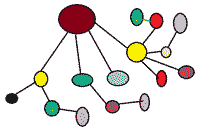
Culture
Why is culture a key part of an anarchist federation?
Too often, proposals for political economic alternatives rest on a mistaken assumption that with the correct ideas about laws, policies, and mechanisms, the desired results will automatically follow. This was a classic error, for instance, in the more "vulgar" Marxisms, which advanced a belief that transformations in the material "base" - i.e. the economic institutions of a society - would necessarily be represented by corresponding transformations in the "superstructure" - society’s ideology and cultural framework. This basic mistake is also widespread in a variety of technocratic interventions and proposals, all assuming that the right institutional design is sufficient to achieve the desired sociopolitical end. It is one of the failings of the contemporary political thought that it has to a large extent ceded the territory of ideology and culture to the statist alt-right - whose image of paternalistic white Christian culture is flawed, myopic, intolerant, xenophobic, and authoritarian.
The anarchist federation vision, on the other hand, recognizes the importance of ideas and culture, and insists that any systemic design capable of sustaining liberty needs to account for the way in which ideology and culture can be nourished and woven into the social patterns and community institutions.
Take worker ownership, for instance. As the well-studied experience of plywood cooperatives of the Pacific Northwest - in which the shares of workers were sold to outside investors or new members were hired as non-participating wage workers - showed, there is nothing intrinsic to mutual or cooperative ownership that precludes the ability to make a profit and at the same time help the community and enhance the wellbeing of the workers. What is required - and what many contemporary worker cooperative advocates fully understand - is that the basic institutions of cooperative ownership need to be enmeshed in a cultural framework that establishes norms of racial and economic justice. In short, people should understand that all firms, all volutary productive associations, are legitimate so long as they don't initiate force against their fellow man. Cooperative and mutualist ventures are every bit as legimate as traditional partnerships or joint stock companies. After all, a mutual is simply a joint stock company with stock ownership restricted to current workers, i.e. a "closely held" corporation.
In an anarchist federation, voluntary associations and their policies are governed by market mechanisms, not rulers or industry "czars." Free markets achieve the kind of community stability that makes ecological sense and community-nurturing possible. But will the mere existence of the capacity for emergent order (i.e. a voluntary free market framework) ensure ecologically sane outcomes? No, not without market-generated law and rational definition of property rights. Without adequate property rights, we get the infamous tragedy of the commons, since it is individually rational to defect in such Prisoner Dilemma Games as unmanaged or unowned commons. Note that some people use "commons" to mean only common resources that are well-managed by some group. This is a semantic cheat, since such "commons" are not genuine; they are in fact the private property of the managing group. The type of commons most subject to tragedy of the commons are de facto unowned resources such as the air and oceans. We see the terrible result of the non-property status of these resources - smog, a "continent" of plastic and garbage in the Pacific, over whaling and fishing, and so on. The solution to pollution is rational legal definitions and the sanctity of property. These depend on cultural attitudes and ideology.
What are the most important strategies for building such a culture?
It is first helpful to recognize that the project of creating and nourishing a culture capable of supporting and animating an anarchist federation is equivalent to the establishment of a new common sense. While oppositional cultures, grounded in jealousy and antagonism, fight for a share of government power, a true systemic alternative will very likely depend on changing the basic understanding of society, the economy, and ideas like community and liberty for a large number of people. Or, smaller liberty oriented groups can create their own libertarian communities, and pretty much ignore the outside statist world. In other words, while calling out injustice and corporatism's many failures is critical, if cultural interventions serve only to reinforce the camp of the righteous, whose identification depends on a corresponding identification of the wicked, it may be better to "create the world in which we wish to live" locally, rather than trying to drag along the statist-minded masses.
Our task, however difficult, is to imagine a new America, even if we start our battle for liberty on a personal or local level. At any rate, creating a Galt's Gulch or a Free Nation, practically speaking, requires exploring methods of framing our ideology whenever possible in ways which do not reinforce the existing statism, but rather which undermine the psychological dependency and authoritarian presuppositions that currently forestall the emergence of a free, stateless society.
What are some examples of the development of the cultural transformations toward a free society at work today?
- New Nation and Gulching movements.
- Strong crypto, alternative currencies, and blockchain technology.
- Increasing distrust in rulers and loss of legitimacy for the State.
- The resurgence of libertarian ideas in media, especially online.
The many examples of government failure, from 9/11 to incarceration rates to monopoly police routinely murdering people of color and kidnapping people for victimless "crimes," are pushing people to reconsider libertarian ideas. When the money is no good, there will suddenly be many "anarchists." While these new anarchists will mostly be shallow, our online essays and articles and educational efforts will help them become consistent and knowledgable about liberty. Many if not most small business people are already open to and supportive of free market institutions. It is the former government employees, pensionaires, and retired military personell that are likely to be most resistant to freedom, at least at first, for cognitive dissonance reasons.
A culture of liberty allows people to help themselves. The people of Detroit, when their incompetent city government went bankrupt, quickly found voluntary means to provide water, security, and other services - all without compulsion or government force. When the government gets out of the way, people can solve things on their own.
See also:
Free Nation Foundation archives.
Further reading:
Ilya Somin, Libertarianism and Culture.
Claire Wolfe, 101 Things to Do 'Til the Revolution: Ideas and Resources for Self-Liberation, Monkey Wrenching and Preparedness.
Mario Vargas Llosa, The Culture of Liberty.
 Intro |
 America |
 Federation |
 Decentralization |
 Liberty |
 Culture |
 Money |
 Markets |
 Hogeye Bill's Anarchism Page |